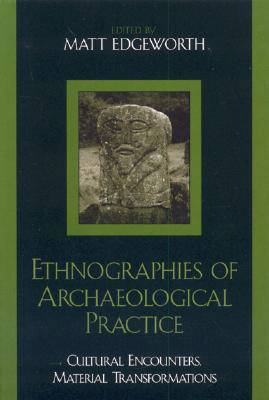
Door een staking bij bpost kan je online bestelling op dit moment iets langer onderweg zijn dan voorzien. Dringend iets nodig? Onze winkels ontvangen jou met open armen!
- Afhalen na 1 uur in een winkel met voorraad
- Gratis thuislevering in België vanaf € 30
- Ruim aanbod met 7 miljoen producten
Door een staking bij bpost kan je online bestelling op dit moment iets langer onderweg zijn dan voorzien. Dringend iets nodig? Onze winkels ontvangen jou met open armen!
- Afhalen na 1 uur in een winkel met voorraad
- Gratis thuislevering in België vanaf € 30
- Ruim aanbod met 7 miljoen producten
Zoeken
Ethnographies of Archaeological Practice
Cultural Encounters, Material Transformations
€ 120,45
+ 240 punten
Omschrijving
Ethnographic perspectives are often used by archaeologists to study cultures both past and present - but what happens when the ethnographic gaze is turned back onto archaeological practices themselves? That is the question posed by this book, challenging conventional ideas about the relationship between the subject and the object, the observer and the observed, and the explainers and the explained. This book explores the production of archaeological knowledge from a range of ethnographic perspectives. Fieldwork spans large parts of the world, with sites in Turkey, the Netherlands, Mexico, Brazil, Italy, Germany, the USA and the United Kingdom being covered. They focus on excavation, inscription, heritage management, student training, the employment of hired workers and many other aspects of archaeological practice. These experimental ethnographic studies are situated right on the interface of archaeology and anthropology_on the road to a more holistic study of the present and the past.
Specificaties
Betrokkenen
- Uitgeverij:
Inhoud
- Aantal bladzijden:
- 216
- Taal:
- Engels
- Reeks:
Eigenschappen
- Productcode (EAN):
- 9780759108448
- Verschijningsdatum:
- 4/05/2006
- Uitvoering:
- Hardcover
- Formaat:
- Genaaid
- Afmetingen:
- 164 mm x 237 mm
- Gewicht:
- 458 g

Alleen bij Standaard Boekhandel
+ 240 punten op je klantenkaart van Standaard Boekhandel
Beoordelingen
We publiceren alleen reviews die voldoen aan de voorwaarden voor reviews. Bekijk onze voorwaarden voor reviews.










